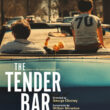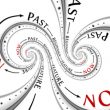When you write a memoir, you place yourself as a “character” in your story. At the heart of any story is someone struggling with a problem, and how they change. In the case of memoir, that someone is you. There are several aspects to being the protagonist of your own story: You have a longing or a need. There is some kind of wound or problem. There is an opposing force to solving the problem. A protagonist presents a persona. This does not imply it’s false, simply that you’re not required to … [Read more...]
A Memoir Teacher’s Critique of the memoir-turned-movie: THE TENDER BAR
The Tender Bar: A Memoir is a book you should read if you haven’t. It’s the kind of book that stays with you for the many questions it surfaces about maleness in our culture, about identity and fatherlessness, and about the fierce bonds that often form between sons and their single mothers. The Tender Bar, the movie, glossed over a lot of this and focused instead on one young man’s unlikely journey to Yale. Although in the book J.R.’s love interest is an interesting thread, impactful … [Read more...]
The Intersection of Memoir and Poetry
This post is inspired by Jacqueline Woodson, author of many books, including her memoir-in-verse, Brown Girl Dreaming. In addition to teaching in our upcoming boot camp (September 22-October 27), Jacqueline is a guest this week on my podcast, "Write-minded," where she shared her thoughts about memoir and poetry. She said: When we’re writing memoir, we’re writing the small moments. When we think about memory, memory does not come in a linear narrative. Memory comes to us with lots of … [Read more...]
Enliven Your Memoir with Sensual Details
When we write memoir, we’re creating a story, and re-creating moments in our lives rich in detail, experienced through the body. But sometimes we forget or don’t yet grasp just how much we need to bring forward those details so the reader can live that experience alongside us. Writing stories means that our task is to create “real life” experiences a reader can participate in, that reach into their hearts and minds. How do we do this trick? Create that kind of intimacy? The secret: write scenes … [Read more...]
Theme as Your Memoir’s North Star
Is there such a thing as a memoir without a central theme or themes? Yes, but it’s called an autobiography, or just a bunch of strung-together scenes about “what happened,” which is not enough to make a meaningful memoir. Theme can be a tough topic for memoirists to wrap their minds around. After all, most of us have lived very big and full lives and sometimes writing with theme in mind feels like reducing your experience to just a small part of your life—not necessarily representative of the … [Read more...]
What to Avoid and Embrace When You Write about YOU in Your Memoir
People often ask me about memoir do’s and don’ts. What makes or breaks memoirs? What do the best memoirs have in common? High on that list is the memoirist’s authenticity, the degree to which the writer understands themselves and can create a nuanced picture of themselves as a whole person. Speaking of don’ts—memoirists should never portray themselves as all good or all bad. They shouldn’t take all the credit for all the good that’s manifested in their lives, nor should they take all the … [Read more...]
Why and How to Do More “Takeaway” in Memoir
Takeaway is the most important part of memoir writing that most memoirists don’t know how to do, or don’t do well or often enough. In my memoir classes, I share with students that I came to be so obsessed with takeaway first as an acquiring editor for Seal Press, because I knew as soon as I got to an editorial meeting, the marketing team would ask, “What’s the takeaway?” If it wasn’t apparent, the book wasn’t acquirable. Later, as I began to teach this genre and shepherd more authors through the … [Read more...]
Where Are You NOW? Tracking “Now” in Memoir
Because I have the great honor of reading about 70,000 words (an entire book-length manuscript) every single month for student homework alone, I come across this problem of when “now” is in memoir on a weekly basis. “Now” cannot occupy two separate spaces, times, or eras. For your readers, there can only be one now. One of the most jarring things beginning memoirists do is to pull the reader out of a given scene by referring to the “now” of today, when they’re writing the book, in 2018 or … [Read more...]
Why to Ditch “I Remember” in Your Memoir
A memoir, by its very definition, is an account of your personal experience, which means it’s a compilation of what you remember. Because a memoirist’s entire book is a series of remembrances, the words “I remember,” especially when remembering from the vantage point of “now,” by which I mean the now of when you’re sitting down to write your story, are almost always redundant. Most of the time I find that “I remember” is easily deleted, as in: I remember when she came home that … [Read more...]
Practice Makes Perfect: Why Practicing the Art of Scene Writing Is the Path to Memoir Excellence
Scenes are the building blocks of memoir. Given this is so, you can’t really begin to write a great memoir—heck, even a good memoir—until you master scene. Linda Joy and I teach scene in nearly all the classes we teach. (In fact, we did a recent hour-long intensive on scene that’s available to view here.) And as much as we know how important it is for memoirists to wrap their minds around the mechanics of what’s involved, there’s no substitute for practice. In my opinion, practice comes in … [Read more...]









